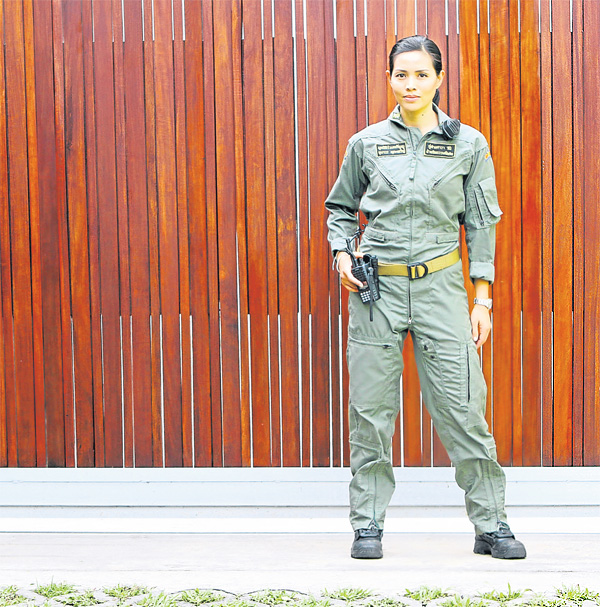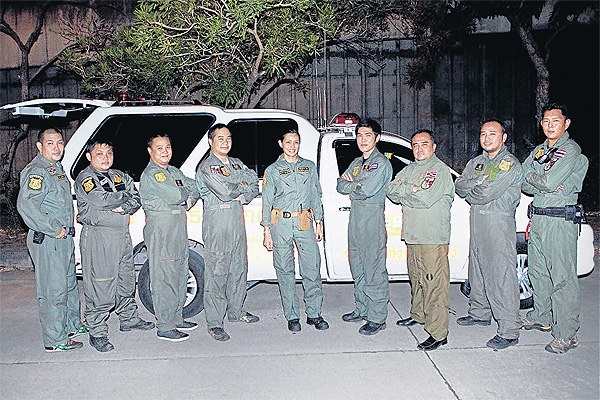There is a sharp contrast between Fon Windsor-Clive's home and her choice in life. Her spacious abode feels safe and cozy, dotted with beautifully framed pictures of her family.

Nothing in her home, or in her kind personality and degrees in photography and museum management, hints at the tougher and more adventurous side of her life - being a rescue volunteer for Ruamkatanyu Foundation and Rajavithi Hospital's Narenthorn Emergency Medical Service Center, a job which sometimes requires her to prowl the street at night with the siren car and sleep on narrow plastic chairs.
Fon, a mother of two girls aged eight and five, has always been keen on lending a helping hand. It's in her blood, she says, having descended from a line of civil servants and doctors. While in the UK, she spent her Christmases not celebrating with big parties, although her privileged background would certainly allow that, but instead giving food to homeless people.
"I just felt that if I were in their position, I would be really glad if someone did the same for me. I did it because it made sense. There is no need for more reason," she said.
During the floods last year, she had the chance to help Ruamkatanyu Foundation in distributing necessities, and realised that there were so many things - seemingly simple things - that she could not do.
"Not many people know how to transport people in an unfit condition. There were heavily pregnant women, older people with diabetes and people with heart diseases who needed to be evacuated from their homes. I was just standing there, not knowing what to do, and I felt really bad not being able to help them.
"I decided right then that I should get some training so that I would know what to do in similar situations," said Fon, who enrolled in a three-day First Responder (FR) course shortly after.
After the FR training, she expressed an interest in helping and volunteered to go on rescue missions with the foundation's ambulance. The first case she came across was two young girls sprawled on the motorway after a car accident as a result of their drunk-driving father.

"They were about my daughters' ages, and it was really heartbreaking. Accidents can happen to anyone at any time. I just thought it would be great if I could do more to help, so I decided to take the next step and get EMT-B training at Rajavithi Hospital last February," said Fon, referring to Emergency Medical Technician-Basic training, which teaches emergency skills to care for victims of sudden injury.
During the 110-hour course, which became a major part of her life for a month, she met like-minded people who also wanted to help those in need. The course also required 10 on-site cases with Narenthorn EMS Center.
The intensive training in the classroom was another world from being at the scene of an emergency. The chaos, the immediate need for help, the emotions overflowing from people at the scene and the fact that every decision could mean life and death were challenging. It is not easy work, and everyone in the team has to cooperate under pressure.
She is now volunteering for both Narenthorn EMS Center and Ruamkatanyu Foundation and has learned a lot from both her team and the incidents she has attended. More than anything, the experience has taught her about the uncertainty of life, and the beauty of meeting good people.
"The people I've met, whether on training courses or missions, really restore my faith in mankind. Before this, I heard so much about unkind people. Now I know there really are many good people in our society, and I feel thankful to have met them," said Fon, who has been going on rescue missions for six months now.
She also added that some of the volunteers buy their own equipment and pay for their own extra training courses so that they can help people more, because available resources are sometimes not adequate.
Despite the intensive training, nothing prepares her or other rescue workers to deal with the emotionally wounded.
"I do not feel as bad for the dead as I do for the living. One time, a couple was in a car accident, and one of them died on the spot. The other, who was still in a shock, kept talking to the dead spouse as if nothing had happened. It's a very traumatising experience, even for some of my teammates who've done this for years. It breaks our hearts every time."
Having mentioned that, Fon feels that there is a lack of emotional support for living victims who might not be physically affected by the incident but were emotionally traumatised.
"Nobody has been trained to talk to them using psychological approaches. Usually they are left standing there, or some people might go over and tell them not to cry, which is of course impossible after such a loss. Thailand doesn't have proper grief counselling, and I think it's very important to have a specific place where rescue teams can refer these victims to," she said.
She also wishes more women would step forward and join rescue teams. Fon, who is the only woman in her seven-person team, sees the importance of having a woman's touch on rescue missions.
"Some female victims would not want to tell male rescue volunteers about their problems because it's a sensitive issue. Some are reluctant to have male volunteers touching their body and would prefer to get help from a woman."
Fon admits that it is quite a demanding task in terms of both time and energy. As a mother of young children, it is even more challenging.
"I have to make sure my daughters are in safe hands all the time, because I never know when I will have to go out on a mission. Some people view that as being negligent, but I'd like to argue that I know my kids are under trusted care in a safe place. If I'm in the position to help others, I will."
The mission can be extremely rewarding, and Fon recalls one special day when she and her teammates took turns doing CPR until a young man came back to life.
"We thought the chance was slim and as several minutes passed, we thought we'd lost him. He came back to life after 25 minutes. At that moment, I felt that all the hard work I'd done and all the training I'd been through were all worth it. The feeling of having saved someone's life is priceless."
Fon would like to encourage everyone to give back to society in some way, especially by helping those around them.
"What I'm doing is only buying more time before the person gets help from a doctor, and keeping them company until they are in a safer place. It might not sound like a big deal, but if I were in an accident, that's what I would want to have."

Fon and her team. Photo taken by Swiss journalist Christian Bauer for the Swiss National Newspaper.
CONTACT INFO
- Emergency Care System Development Fund
Rajavithi Hospital Foundation: 2 Phayathai Rd, Ratchathewi,
Bangkok 10400. Telephone: 02-354-7997
- Ruamkatanyu Foundation Headquarters
19 Moo 13, Bangplee-Yai, Bangplee, Samut Prakan.
Hotline 24-hours: 02-751-0951-53

